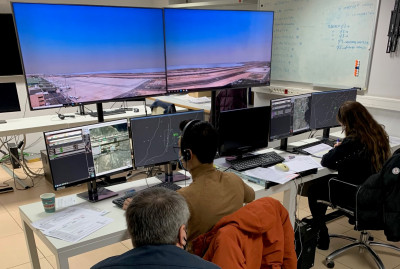Home News & updates Customer story/case study Customer story: Remote piloting with TotalControl
The Covid-19 pandemic has had a devastating impact on the global aviation industry. With air traffic volumes plummeting due to border and travel restrictions, air navigation service providers are needing to rethink how they train air traffic controllers to reduce costs and increase efficiency.
Airways International is now delivering and installing simulators remotely – and provides remote simulator piloting as a tool to help ANSPs reduce training costs, minimise time off roster for ATCs, and enable greater flexibility in sim training with the ability for pilots to work from anywhere.
Read about three of our customers who are utilising remote piloting with TotalControl, and how they are benefiting.

Reduce operational costs
Less travel costs
Less time off roster for ATCs
More efficient resourcing for piloting sim exercises

Increase efficiency
Centralised hub of pilots
Share resources across multiple locations
Fast resourcing of sim exercises to quickly ramp up sim training

Improve training quality & flexibility
Provide consistent training to multiple locations
Flexibility for sim pilots to work from home
SAERCO, a private air navigation service provider which delivers services across Europe, has been using TotalControl simulators to train ATCs since 2014. Desktop simulators are located in Madrid, Fuerteventura (Canary Islands), and Kjevik in Norway – all managed from a central sim piloting hub in Madrid.
The number of simulator pilots fluctuates depending on SAERCO’s needs – up to 20 pilots can be deployed to run exercises for the remote desktop sims as well as the two tower and six radar simulators at the Madrid training centre.
In addition to reducing costs and minimising time off the roster and away from home for ATCs, SAERCO has discovered other benefits to remote piloting, says Jorge Avila, SAERCO Managing Director.
Having our pseudo pilots in the same place helps to improve the quality of simulations. And in Covid times another advantage becomes obvious – despite travel restrictions within regions we’ve been able to keep running simulations and these are more important than ever due to the low traffic situation.
Jorge Avila
Managing Director, SAERCO
Jorge adds that running simulation exercises remotely also makes for easier planning and coordination. It’s much easier to organise sim sessions at short notice when the need arises, and travel time for ATCs has reduced significantly, especially in the Canary Islands where five SAERCO towers are situated.
There is no longer a need for Canary Islands ATCs to travel to Madrid for sim training – usually, a day trip to Fuerteventura is all that’s required.

Airways International Ltd recently remotely installed six large TotalControl tower simulators (four with dedicated surveillance sims), six mobile simulators and 17 aerodrome environments at 12 sites throughout Norway.
A centralised simulator pilot hub has been established at Værnes, one of the six sites with a tower simulator. Sim pilots are trained at this hub and run exercises remotely for each of the six main sites, as well as the sites where the six mobile simulators are deployed.
One major benefit of remote piloting for Avinor is the ability to quickly ramp up sim training when the need arises. In the simulator at Gardermoen Airport in Olso, simulator exercises involving 80-100 movements an hour are often required – with sim pilots operating remotely, this can be resourced quickly and efficiently.
The ability to utilise a small pool of pilots to run consecutive sim exercises across multiple locations is another benefit – creating efficiencies around sim pilot rostering and scheduling of sim runs.
Remote piloting has enabled Avinor ANS to use the TotalControl simulator in a very flexible way. To be able to use pilots from the centralised pilot centre either solely or in combination with local pilots was our ambition when we started the procurement process, and to see this concept work even better then we expected is very satisfying.
Ragnvald Godø
Avinor ANS Project Leader – Airways-Avinor simulator project
TotalControl simulators have been used to train Airways air traffic controllers since they were first developed more than 15 years ago. Airways is now utilising mobile desktop TotalControl simulators to deliver training to ATCs in regional towers throughout New Zealand, and simulator pilots working remotely to increase sim training efficiency and frequency.
Airways has deployed mobile desktop simulators to several regional towers for training ATCs, enabling simultaneous sim training across multiple locations as a safe and effective remote training solution that requires no travel for ATCs.
Dean Urquhart, ATS Manager Planning & Performance for Airways, says remote sim piloting with mobile simulation enables Airways to take a much more agile approach to training ATCs.
“I’m really excited to have introduced remote piloting into our mobile simulator training – this provides us with many more training opportunities for ATCs needing to refresh their skills, and for our ab-initio students working towards their ratings,” Mr Urquhart says.
Having the ability to pilot exercises remotely allows us to plan training more efficiently. During these times of the Covid-19 pandemic, this means we can continue training safely with less disruptions in the event of any further restrictions or lockdowns.
Dean Urquhart
ATS Manager Planning & Performance, Airways New Zealand
TotalControl advanced simulation combines unparalleled photo-real graphics with an easy-to-use, intuitive interface – bringing you one of the most realistic digital simulation platforms on the global market.